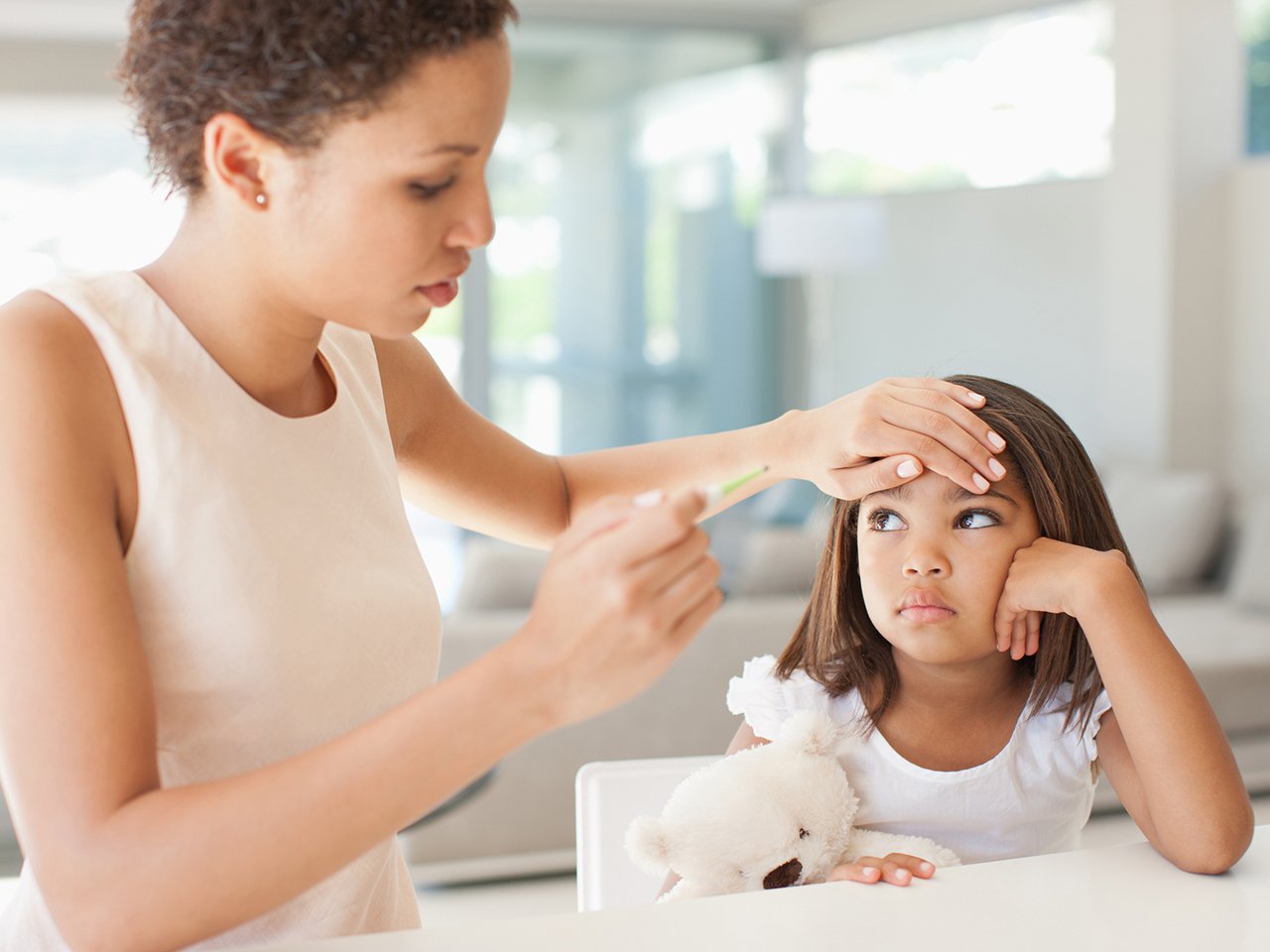Photo: Stocksy, Illustrations: Allison + Cam
Coralie Metcalfe used to think the flu was no big deal. “I never got my flu shot. I’m totally pro-vaccine, but I just never thought I needed it,” she explains.
That changed after what happened two years ago when she went to wake her 15-month-old daughter, Annie, for daycare. Annie was pale, her breathing was shallow and she wasn’t moving. Metcalfe got her up but couldn’t keep her awake—Annie kept passing out in her arms. They rushed to the emergency room, where doctors found she was having serious trouble breathing and her heart was working so hard to compensate that her heart rate was high as well. “I was hysterical,” Metcalfe says.
Doctors would later tell Metcalfe that what she—and her paediatrician—had thought was just a bad cold was, in fact, the flu, and it had turned into pneumonia almost overnight. Metcalfe was filled with self-blame. She actually had been planning to get her daughter the flu shot that year, but it was mid-December, and it just hadn’t happened yet. The appointment was booked for three days later.
Many people think of the flu as a bad cold rather than something that could cause a hospital visit. In fact, a third of Canadians report that they won’t get the flu shot this year—and even fewer kids do. Many people say that’s because they think the flu just isn’t that bad.
But while they might be rare, serious complications from the flu do happen, and children are especially vulnerable. Last year, at least 1,350 kids age 16 and younger were hospitalized with the flu in Canada. Many needed serious care, with 269 kids ending up in the ICU. And 10 kids died, most of them under five years old.
“For the majority of average adults, they’ll get sick for a few days and might feel crummy for a few weeks. But anybody who has cardiac disease, respiratory disease, immune problems, diabetes and cancer, as well as kids—they’re all at risk of ending up in hospital and even dying,” says Janice Heard, a paediatrician in Calgary and member of the Canadian Paediatric Society’s Public Education Advisory Committee.
Which kids are at risk?
Kids five and under are a high-risk group, and kids two and under even more so. For them, the flu is more likely to progress into serious illnesses like pneumonia, croup, bronchitis, sinus infections and ear infections.
That’s because their bodies respond differently to getting sick. Unlike adults, whose ramped-up immune systems have seen many similar viruses before, kids have to create a new immune response for every disease, which is hard work for their bodies, takes time and energy, and leaves them run down. Their smaller airways also have a harder time handling swelling, as well as the mucus in their lungs, which are both part of the immune response to the virus.
“You and I can have a narrowing of our airways by a couple of millimetres, but if an infant has that narrowing, it becomes a big deal,” says Alex MacKenzie, a paediatrician at Ottawa’s Children’s Hospital of Eastern Ontario.
Kids with the flu are also more likely than adults to have gastrointestinal symptoms, like diarrhea and vomiting, which makes them more likely to become dehydrated. In some little kids, high fevers can cause febrile seizures.
Some groups of older kids are also at a higher risk, including those who have chronic lung conditions like asthma or cystic fibrosis; those who have immune-weakening conditions like cancer or HIV; and kids who live on reserves, because of the impact of colonization, which has led to overcrowding and poor housing conditions.
What are symptoms of flu in kids

How to take your kid’s temperature
Symptoms of the flu tend to include a fever, headache, cough, a runny nose and aching muscles. One easy way to tell the difference between a cold and the flu is the flu almost always comes with a fever. You can also look at your kid’s energy levels: “With most colds, after the first 10 or 12 hours, kids pop back,” says Heard. “With influenza, they tend to be laid flat.”
If you suspect your newborn has the flu, take them to the doctor. Older kids who are otherwise healthy don’t need to see a doctor for the flu, but if they have a fever that can’t be controlled with medication, haven’t peed in six hours, or seem to get sick again after getting better, take them to the doctor. “If the child rallies and then suddenly they have a fever again, immediately go to a doctor, because very often that’s a secondary bacterial infection—like an ear infection, sinus infection or pneumonia,” says Heard.
The most important thing to watch for with flu in kids is breathing difficulties. “If they are coughing non-stop or complaining of chest pain, head to the hospital. If they are having trouble catching their breath, working hard to breathe, or their lips turn blue, call 911,” says Heard.
If your kid does end up being admitted to the hospital, they might be put on antibiotics, given oxygen to help them breathe, or given fluids through an IV. Sicker kids, especially babies, are sometimes put on a ventilator, but that’s unusual, says MacKenzie.
How to prevent the flu in kids
Little kids are notoriously good at picking up the flu, since they hang out in daycares and play centres with other potentially infected children, and because they tend to put everything in their mouths.
But there are things you can do to minimize the risk of flu in kids. To prevent the spread of the virus, teach kids to sneeze into their elbows or a tissue and encourage all your family members to wash their hands often during cold and flu season. Clean toys after babies mouth them and don’t share bowls, water bottles or utensils.
Your best defence, however, is a good offence. The flu shot makes kids less likely to get sick, and if they do get the flu, its symptoms will be less severe—and it’s less likely to end in a serious complication. It’s recommended all kids over six months get the flu shot, and all caregivers and people in a household with a kid under five should as well. Pregnant women should get the flu shot for themselves, since they’re also a high-risk group, and so that their babies are born with some protection.
Annie recovered and doesn’t really remember what happened. But Metcalfe says Annie’s 12 days in the hospital—and the constant threat that she might need to be intubated—was so traumatic it gave the mom lasting anxiety. “She was stable, but critical. I remember being up all through the night and holding her down screaming while they stuck tubes down her throat to suction her lungs.” This year, her family was the first in line at their paediatrician’s first flu shot clinic of the season. “It’s a top priority for us now.”
Soothing a flu-sick kid
Lower their temperature: Kids will usually feel better if you can bring down the fever. Give ibuprofen or acetaminophen (but not aspirin) according to directions. A lukewarm (not cold!) bath and lightweight clothing will also help them cool down.
Make sure they drink up: Offer lots of fluids, like water, milk, breastmilk, watered-down juice or Pedialyte. Try to feed them small, frequent meals to make sure they’re staying hydrated and well nourished.
Ensure they rest: Encourage kids to rest and sleep as much as possible. Keep them home from school, daycare and activities while they’re sick—both so they can recover faster and to avoid spreading the flu to others.
Ditch the cough medication: There is no evidence that over-the-counter cough and cold medications are helpful for children under the age of six, and they might actually be harmful: Suppressing a cough prevents the lungs’ ability to clear the mucus. There have also been incidents of kids under two overdosing on cough medication. Instead, try giving them warm water with honey and lemon to soothe throat pain and ease coughing, suggests Heard. (But don’t give honey to kids under one, due to risk of botulism.)
Read more:
Why everyone should get the flu shot—even babies and pregnant women
11 tricks for making a sick day less stressful


